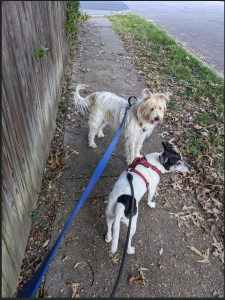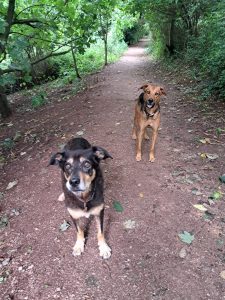PC 862: FLASH FICTION EXTRAVAGANZA: Canine Companions
Show Notes
“A Strange and Terrible Wonder” Rated PG
“The Dog Who Buried the Sea” Rated G
“What Wags the World” Rated G





A Strange and Terrible Wonder
by Katie McIvor
The dog bus makes its rounds once a year through the lands of myth. Starting in the north, in the early morning — so early it’s barely yet light — the bus rolls up to a middle-of-nowhere sign by the roadside. In the misty grey dawn, in the shadow of the hill which mounts into blackness above, the Cù Sìth is waiting. Its haunches twitch on the wet grass.
As the bus approaches, the Cù Sìth emits three sharp, haunting barks, which for miles around cause children to wake from their sleep and huddle in their blankets, sheltering their heads beneath the safety of pillows.
The door wheezes open. Onto the first step come the Cù Sìth’s paws. The smell of stagnant water precedes it. Up close, the dog’s fur is a dark, bog-like green, the colours of the endless moor. Its eyes burn with a spectral gleam. The driver nods hello, and with a whine the Cù Sìth bumps its nose up into his hand. Its claws click on the vinyl as it makes its way down the aisle.
The bus drives on. Headlights smothered by the moorland fog, it creeps south. The grey city grows around it. In the kirkyard, its tiny shape lost in the deep, gravestone gloom, a terrier wags its tail. When the doors open, it springs up into the bus and leaps into the driver’s arms, licking his face with a small, ghostlike tongue.
“Away with you, Bobby,” says the driver, but his eyes are smiling.
Bobby avoids the steaming, bull-sized bulk of the Cù Sìth. He sits up front, just behind the driver, his tiny paws against the window.
They continue south. On a lonely road in Northumberland, a huge black creature waits with its front leg extended: the Gytrash, foe of solitary travellers. Heading westwards and then down the M6, they stop to collect the phantom Moddey Dhoo, fresh off the ferry from Douglas. The new passengers sit aloof from one another, each taking up a double seat, curled like enormous, matted cats. Bobby’s wary eyes flit between them.
Wales is slate-grey with rain. Halfway down the tree-lined slope of the Nant y Garth Pass, a shuddering howl halts the bus, and the Gwyllgi, the Cŵn Annwn, dog of the Otherworld, comes aboard. The driver chucks it absentmindedly under the chin. In its wake, a small, bouncing shape appears: a corgi, with her fairy rider perched side-saddle. The fairy flies up to hand her fare to the driver, but he knows better than to accept coin from the fair folk.
Back into England, and on through miles of dull motorway. They stop at a service station somewhere near Wolverhampton. At this strange, perpetual dawn hour, only red-eyed lorry drivers peer from their curtained cabs, and they think nothing of the procession of phantom hounds which crosses the tarmac to pee on the litter-flecked grass and drink, one by one, from the dirty metal water bowl.
The next stop is a cold, dark little church where the wind shrieks through the branches of yew trees. The church grim trots out, stretching his hind legs. He greets the Gytrash politely, nose to nose, for they are old comrades. The others he ignores.
Black Shuck has roamed to the very edge of his eastern domain to catch the bus. Giant head raised, steam spouting from his nostrils in the cold, deathly air, he climbs aboard. The driver feels a chill pass over him, as though of footsteps over his grave, but he pats Black Shuck on the head all the same, though he has to reach up from his chair to do it. Black Shuck’s glowing eyes soften to a pale, almost pleasant yellow beneath the strip lights. He takes his seat across the aisle from the Cù Sìth, whose bog-damp fur gives off an odour that is comforting to him, reminiscent of the Norfolk Broads.
The streets of London are ghostly at this hour, abandoned even by the drunks. At 31 Kensington Park Gardens, a large Newfoundland waits patiently by the gate, her three floating charges in tow. The children whoop with excitement as they board, causing the corgi to leap up with an ear-splitting bark and bound into the air, trying to nip their ankles. The fairy, dislodged from her nap, yanks on the corgi’s reins, while Nana herds the children back to the front of the bus and sits them down in an orderly manner.
Moving through the south-west, they collect the Devil’s Dandy Dogs, fresh from a night-time hunt, and the cowed, scavenging mutts of the Camelot kitchens. Then the bus, now nearly full, jolts up onto Dartmoor, where awaits the most fearsome hound of all: the slavering beast of the Grimpen Mire. Its great jaws drool misty vapour as it slinks up the aisle of the bus.
They descend towards the coast. The driver knows the place: the secret beach where, once a year, the dogs of myth take their outing. Despite the long drive, dawn has just broken by the time they arrive. The beach is long, perfect, empty of the picnickers and holidaymakers who will soon swarm its picture-postcard dunes. They have the place to themselves.
The interior of the bus trembles with energy. The dogs sit poised and upright, only the intense wagging of tails betraying their eagerness. When the doors slide open, the excitable corgi is the first to tumble down the steps, her fairy rider cursing and hauling ineffectively at the reins. The Camelot mutts are right behind her. They writhe and trip over one another in a tangle of hairy legs, while the Devil’s Dandy Dogs snap at their tails. Next come the Gytrash and the church grim, at a stately pace, shoulder to shoulder. Black Shuck and the Cù Sìth follow. The Gwyllgi and the Moddey Dhoo skulk after them, glancing over their shoulders at the Dartmoor Hound, which paces lone and panther-like from the back of the bus. Lastly, Nana shepherds her three children down the steps, and only Bobby is left, polite and patient as always, waiting for the driver. The old man and his old dog walk the path to the beach side by side.
The sand shines primrose-yellow in the sunlight. Deep-clawed prints race to the shore, where a cacophony of splashing, leaping, and barking unfolds in the shallows. The Camelot hounds coat their skinny bodies in sand, eyes rolling with delight, while the Devil’s Dandy Dogs take off as one in pursuit of a seagull. The corgi is a frantic, cannonballing blur, her thick fur soaked, her fairy rider laughing through the saltwater spray. Even the deathly dogs, the portents of the underworld, frolic for all they are worth in the sea and pass a red rubber ball from jaw to dripping jaw. The Dartmoor Hound, overcome with sudden excitement, takes off and races its own long shadow from one end of the beach to the other.
On the dunes, Bobby and his owner sit and watch the sunrise. They are quiet with each other, after all these years. The old man rests his hand on Bobby’s wiry fur. The soft sand feels kind beneath their stiff limbs. A little way below them, her tongue lolling contentedly, Nana oversees the construction of a sandcastle.
The sun begins to lift into the sky as the day draws on, and the shadows shorten. The Moddey Dhoo solidifies in the brightness, no longer ethereal, nothing but a large spaniel splashing delightedly in the surf. Black Shuck, with his wolfish fur slicked into spikes, could be any oversized black dog, the Gwyllgi any capering mastiff. Even the Cù Sìth, although the height of a horse and the colour of submerged moss, might be mistaken for a family pet as it barks and frisks on the wet sand. Duties forgotten, for this one day of the year, they are free.
As the holidaymakers begin to appear over the crest of the dunes, the bus driver whistles to his pack. One after another, the dogs of legend shake water from their coats and trot up the beach towards him, panting and laughing. The corgi plants sopping paws on the driver’s knees, and the Dartmoor Hound, in a fit of exuberance, surges up to lick his weathered cheek. But to old Bobby, who waited for fourteen years by a grave in Greyfriars Kirkyard, the scene is already a dream. He lies fast asleep and smiling in his master’s arms as the mythical pack piles back onto the bus.
The Dog Who Buried The Sea
by Andy Oldfield
Gather now nestlings and feather-kin, settle your wings and listen, lest this tale should be forgotten in the cold, dark days to come.
Remember the Bone Man and the Bone Dog. Remember the gifts that come unexpected. And always remember that those good days may come again, when the beaks of jackdaw, chough and rook, of magpie, jay, crow, and raven never go hungry.
In the days of your grandmother’s grandmother and grandfather’s grandfather the winter snows fell deep, bitter, and long. Ice and wind stole our food and our lives. Badger and fox claimed our dead, and we grew weaker and fewer.
Hope shrank and shrivelled, like our bellies. Until, one day in the nest-houses of men and women, a strange man and his dog came to live. The man and dog were as one, it seemed. The man was young and lean, the dog was even younger and leaner. Soulmates. Nestmates. And they never chased us from the land around their home.
The man fed himself and his dog on succulent meat cut from the bone. And afterwards, instead of hiding the remains inside a lidded bin, like so many of their kind, the Bone Man gave them to us.
Into the bushes, he threw us food. On to the grass, on to the rooftop. Gristle, bone, sinew, cartilage, skin, and flesh. Such sweet stuff, the stuff of which corvids dream. The stuff of life, scattered freely. We ate, they watched. When the Bone Dog watched we could eat with no fear of cat or fox stealing us or our food.
We grew strong and winter died instead of us. When the warmth returned many chicks hatched to see the sun. And still the Bone Man and Dog showered us with blessings. We grew strong, though there were many beaks to feed.
And so it went. Summer after winter after summer.
Although the Bone Dog grew bonier, and the Bone Man began to limp, they still shared their bounty. But one day the Bone Dog lay down and never rose again. The Bone Man sat alone in his garden. Jackdaws hopped around his feet and brought him gifts of feather and stone, but his eyes were dark and wet and empty.
Through his sadness, he still fed us. And then, a new Bone Dog, just like the old one, came into his life and the light in the Bone Man’s eyes returned and all was good. But nothing stands still. As the Bone Dog grew older, the Bone Man grew stiffer and slower until he knew his time under the sun was almost done.
One morning, in the cool dawn light, he scattered our breakfasts and said goodbye. He went down to the sea with the Bone Dog and climbed into a boat and rowed out to the faerie isles that wink in and out of being. With Bone Dog by his side, he lay down on the glimmering shore and closed his eyes to this world. The waves began to embrace him, but Bone Dog knew what to do and began to dig, long bony legs and sharp claws throwing enchanted sand over the Bone Man’s cooling body. Soon, Bone Dog had raised a small mound.
We were watching. We knew that Bone Dog’s efforts would be in vain, as soon enough the faerie isle would slip back into the sea. And so we helped. Hundreds of us took sand by the beak-full from the dunes of the mainland and flew out to the faerie isle. We dropped it and Bone Dog piled it on the Bone Man’s body.
Sand, grass, twig, stone. The sky was black for three days and nights as jackdaw, chough, rook, magpie, jay, crow, and raven carried their loads. The Bone Dog buried the sea and turned a faerie isle into a solid one.
When the Bone Man was safely hidden, the Dog Who Buried The Sea lay down exhausted and we stood by him as he slept. He dreamt happy dreams of when the Bone Man and Bone Dog were young. We joined his dreams with our own. Good dreams for good times.
The Bone Dog woke and knew there was one last task. He looked at us and we nodded. He began to dig one more time, a Bone Dog-sized tunnel into the heart of the island where the Bone Man lay. And as the Bone Dog disappeared from this world, we filled in the tunnel so he and the Bone Man could rest, safe, together, for ever.
Remember, fledglings. Things come and they go. Round in circles: rain, shine, wind, snow. Light and dark. Egg and bone.
One day, when we need them most, the Bone Man and the Bone Dog will return.
Keep watching. From roof and tree, from chimney and bush, from rock and aerial, from forest and field, from cliff and dune, keep your eyes and hearts sharp.
Be ready to rejoice anew when the Bone Man and Bone Dog wake and cast their offerings to the sky.
What Wags the World
by Sarah Pinsker
They have him mislabeled as “mixed-breed” at the shelter, but you recognize him for what he is. More importantly, he recognizes you. The other dogs are doing tricks and throwing themselves at the people walking past. They’re begging for attention. He hangs back, waiting, but when you pass his enclosure he gets up to leave as if it’s already decided.
He’s too arthritic to jump into your car, so you lift him. He sits on the back seat and braces against the movement. You open the window partway since there’s no danger of him jumping out. He leans his head on the sill and breathes deeply, taking in the smells. At home, you count his fatty tumors, feed him supplements for his joints. He leans his white head against your leg. He’s too deaf to hear that you’re calling him Merlin, Merle for short.
He rewards you in the ways that only an old dog can. When you get home, you run your hands over his sides to let him know you’re there. He lifts his head from his bed, then sighs and lowers it again, his tail thumping a gentle welcome. He sleeps on your feet while you watch television, his soft snores a reassurance.
He’s with you for a year before you’re sure you’re right about him. The tumors shrink to the size of pebbles, then they’re gone overnight. The cataracts disappear a few months later. One day, when you say his name, he turns his head to the sound of your voice.
You start to take long walks together, then longer. His limp smooths out. The stiffness gives way to his true gaits: a surefooted trot, a headlong gallop. On a June hike, he darts into the brush and emerges soft-mouthing a sparrow. You take it from him, praise him, release it unharmed. This is the first of many.
Over the next few years, he is your most constant companion. He’s at the door the second you arrive home. You hear his tail thumping before your key is even in the lock. He exhausts himself chasing squirrels and birds and sticks, returns to your side panting and self-satisfied. You take him to the lake and he launches himself from the boat dock like a missile. You buy a ball-flinging device because the arthritis in your own elbow no longer allows you to throw as far as he would like.
He hears everything now, his ears pricking up to catch the neighbor’s dog barking and the cardinals in the holly by the back door. You don’t teach him tricks, but he has a few of his own: his chin on your knee while you’re eating and he wants to remind you he’s there to help you with anything you can’t finish; the unstealthy belly crawl from across the room that never ceases to cheer you when you’re feeling down.
Twelve years after you adopted him, he begins to lose mass. His paws look larger in proportion to his body. He gets leaner and leaner, until he is all angles, all legs and ears and eyes and smile. He loses track of his limbs when he runs, skids out on corners, slides into walls, all with joyous abandon. Awake, he’s a coiled spring, an embodiment of potential energy. His appetite and curiosity are boundless. He sniffs old friends as if meeting them for the first time. He rediscovers smells and tastes and sounds he has known for years.
He gets smaller, softer. He craves contact. When you sit on the floor he climbs into your lap and nips at your ears and fingers, then curls into a ball and falls asleep there. He sleeps more than he has for years. You don’t mind. You appreciate naps more than you used to.
In his final weeks, you bottle-feed him. His eyes squeeze shut and stay that way. The last night he’s with you there’s a flare in the dark bedroom, then a spark, and then he’s gone, still too soon.
There’s no body to bury, so you hike to the lake and sit on the boat dock and skip stones across the water. You will them back to your hand, but it doesn’t work that way for you.
Host Commentary
Good morning, good day, good afternoon and good evening, and welcome to PodCastle, the flying castle of fantasy fiction. I’m your host, Matt Dovey, and I am delighted to present a trio of stories for your enjoyment today, with many very good boys, who’s a good boy, yes you are, yes you are!
And lest you be a cat person, most deeply wounded by our devotion to dogs today–forget ye not our fifth podcast, the mercurial CatsCast, that deigns to grace us with its presence but once a month before scratching to be let outside again to roam free and cause mischief. Every other episode is free to the public, but EA supporters get access to the private feed containing original speculative cat fiction and–we hear, though it would never admit it–belly rubs. Find out more at escapeartists.net/catscast, and support us all at patreon.com/EAPodcasts for the full archive and many other treats besides.
We’re kicking our dog stories off today with “A Strange and Terrible Wonder” by Katie McIvor, narrated by Eliza Chan. This story was first published in Zooscape, August 2023.
#
…aaaaand welcome back. That was “A Strange and Terrible Wonder” by Katie McIvor, and if you enjoyed that then there is a long and impressive bibliography available on her website katiemcivor.com with many free stories on it from markets such as The Deadlands, Interzone and The Dark.
Katie sent us these notes on her story today: I have two dogs – a corgi and a greyhound – and this story originated with me wondering about the fairies who are traditionally said to ride on the backs of corgis. From personal experience, corgis can be extremely loud, excitable, and stubborn, and I liked the idea of a fairy getting exasperated with her wayward steed. Expanding into other myths and legends, I’ve often thought that the dogs of fantasy get a bit of a raw deal: scavenging for scraps in medieval kitchens, or haunting lonely moors. Surely even a church grim or the Hound of the Baskervilles would appreciate a nice day out and a run around on the beach? One real dog, I felt, also deserved an invitation to the bus trip: Greyfriars Bobby, who is famous in my home town of Edinburgh for spending 14 loyal years watching over his owner’s grave. The title is taken from a 16th-century account of an encounter with Black Shuck.
Thank you Katie, for the story and the thoughts.
Next up is “The Dog Who Buried the Sea” by Andy Oldfield, narrated by our own Devin Martin. This story was first published in Flash Fiction Online, November 2021
#
…aaaaand welcome back. That was “The Dog Who Buried the Sea” by Andy Oldfield, and if you enjoyed that then he has a couple of short story collections fot you, Torn Between the Dark and Light and Cornwall Dreaming, with details for both on his website at surfingjackdaw.com along with links to some freely available shorts online.
Andy said this about his story with us: The story came out of a collision between my abiding fascination with mythopoeic fiction, and my experiences of feeding the corvids in my garden with peanuts and leftover bones from my whippet’s food bowl. The title arrived out of the blue one day, and set the mythic tone for me to think about composing the story. The story itself arrived in two main chunks. Initially with narrative bird voices like a sort of Greek chorus drawing me into the corvid world. And then a daydream about faerie isles out at sea and the possibilities for connection and co-operation between mortal man and the other animals he shares the planet with.
Thank you, Andy. And now we close our episode out with “What Wags the World” by Sarah Pinsker, narrated by glorious co-editor Eleanor R. Wood. This story was first published in the much missed Daily Science Fiction, November 2015.
#
…aaaaand welcome back. That was “What Wags the World” by Sarah Pinsker, and if you enjoyed that then oh my goodness there is a whole world of wonderful Sarah stories waiting for you out there, she is one of the best contemporary writers of short SFF today, honestly. She’s only been here once before, sadly, episode 573 The Court Magician which was a Hugo finalist in 2019 and is wonderful, but there’s also a four-parter “And Then There Were (N-One)” at Escape Pod as episodes 652 through 655, about attending a convention of 200 other Sarah Pinskers from alternate dimensions. Yes, it is as brilliant as that conceit sounds. She’s also got dozens of stories and novelettes out in places like Uncanny and Tor.com, all listed at her website sarahpinsker.com–and, as mentioned in her bio, a new novella from Tor.com, Haunt Sweet Home, which I’ve just bought immediately after typing this out.
And Sarah sent us this thought on “What Wags the World”: I wrote this off a Codex contest prompt, but I’m pretty sure the main inspiration was my pup Bo, who was fourteen that year.
Thank you, Sarah, and again to all our authors, for today’s stories and thoughts.
We are, as things stand, very much a pro-dog podcast. Eleanor would be lost without her two Huntaways Leo and Bruno, the latter now 14 years old just as Sarah’s Bo was when she wrote What Wags the World; and you just heard Leo making a little cameo in that last story, and we didn’t have the heart to edit it out given the theme. My two cavapoos Fenrir and Krebeus are sat on the windowsill next to me as I write this, and cannot bear to be in a room without a human: they are just big enough to fully and properly get in the way of a keyboard when sat on your lap. There is an internally infamous email chain inside Escape Artists from a few years back, when CatsCast was first proposed as an April Fool’s joke (including the brilliant line from Laura, now editor at CatsCast, of “Last year, across all four podcasts, more episodes were authored by Cat Rambo than were about actual cats”), and in that chain lines were drawn and we proposed renaming to DogCastle.
(For the record, before I am torn apart on the EA Discord, I am only temporarily without cats after the loss of my beloved and angry Lizzie last year, and the very gentlemanly Henry the year before that.)
This is not a new insight, far from it, but it’s the thread between all three stories above nonetheless, and a characteristic I aspire to and strive for: absolute, utter, unquestioning devotion, that knows no bounds or limits. It is something very admirable, and the times I like myself best are the times I’ve managed to emulate it in my own, poor, human way: when a friend has asked for something and I’m up and moving before their sentence is even finished, because they need something and I will do it without thinking. My best friends are those who would do (and have done) the same for me.
Too much of the world now drives us to be selfish, thinking of how to get ahead because otherwise we’ll fall behind; the global system we live in treats everything as a competition and so trains us to see everyone as competition, when the truth is we achieve so much more when we trust and rely on each other. It’s too simple a proposition to solve all the world’s woes, of course, but still: I think we’d all be in a much happier place if everyone would just try to Be More Dog.
About the Authors
Andy Oldfield

Andy Oldfield is a writer and musician based in Cornwall, UK. He used to be a psychotherapist and journalist, but now splits his time between being out in nature and writing. He is a former editor of CompuServe UK’s SF channel and former deputy editor of FEAR magazine. His fiction has appeared in the likes of Home Page (winner of Readers Choice Award 2018), Flash Fiction Online, Flashquake, HMS Beagle, Interzone and Thaumatrope.
Katie McIvor

Katie McIvor is a Scottish writer. She studied at the University of Cambridge and now lives in the Scottish Borders with her husband and baby daughter. Her short fiction has appeared in magazines such as The Deadlands, Interzone, and Little Blue Marble, and her three-story collection is out now with Ram Eye Press. You can find her on Twitter at @_McKatie_ or on her website at  Katie McIvor .
Katie McIvor .
Sarah Pinsker

Sarah Pinsker’s short fiction has won the Nebula & Sturgeon Awards, and she’s been a finalist for the Hugo twice, the Nebula seven times (including for this story) and numerous other awards. Small Beer Press published her first collection, Sooner or Later Everything Falls Into the Sea, in March 2019, and her first novel, A Song For a New Day, will be published by Berkley in September 2019. She’s also a singer/songwriter with three albums on various indie labels and a fourth on the way. She lives with her wife and dog in Baltimore, Maryland.
About the Narrators
Devin Martin

Devin is a mass of uncooperative cells who occasionally get their act together enough to do things like editing, narrating, and sometimes even writing. Before signing on as Co-Editor, he was an Audio Producer here at PodCastle. He’s narrated for Escape Pod, Strange Horizons, PodCastle, and Far Fetched Fables. He lives in Cardiff with a brilliant scientist. He almost never posts on Bluesky @quietandscreaming and he has a wide range of disturbing cackles
Eliza Chan

Eliza Chan is a writer and occasional narrator of speculative fiction. It amuses her endlessly that people find her Scottish accent soothing. Her #1 Sunday Times bestselling debut novel FATHOMFOLK and sequel TIDEBORN— inspired by mythology, East and Southeast Asian cities and diaspora feels — are out now from Orbit. Her short fiction has been published in The Dark, Podcastle, Fantasy Magazine and The Best of British Fantasy. When not working on her current novel or reading, Eliza can be found boardgaming, watching anime, toddler wrangling and dabbling in crafts.
Find her on instagram @elizachanwrites or on her website www.elizachan.co.uk.
Eleanor R. Wood

Eleanor R. Wood lives by the sea in a rambling Victorian house filled with books, plants, and aquariums. She has two dogs, zero cats, and never enough liquorice. Her stories have appeared in dozens of venues, including Galaxy’s Edge, Nature: Futures, Fireside, The Best of British Fantasy 2019, and Best of British Science Fiction 2020.
You can find a full list of her published work at creativepanoply.wordpress.com.


